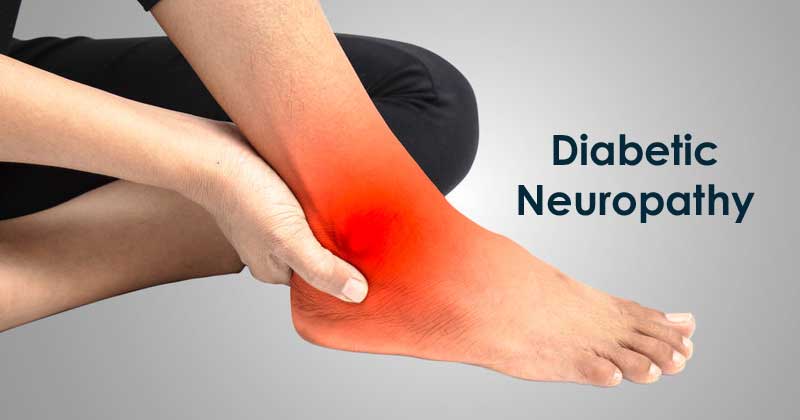-
Choose Store:


- Track Your Order
- My Account
- My Wishlist
- Log In
Diabetic Neuropathy- Know Its Symptoms and Causes

Diabetic neuropathy is a major complication for diabetic patients as it causes damage to their nervous system.
It is a progressive disease and can get worse with time, if not treated.
Diabetic neuropathy usually damages nerves present in the legs as well as feet.
In this blog, you will know about diabetic neuropathy, its symptoms, and its causes.
What do you understand by diabetic neuropathy?
Almost 50% of people with diabetes suffer from diabetic neuropathy condition which is a severe diabetes complication.
When suffering from this medical condition, you experience pain & numbness in your legs, and feet depending on the nerves which are affected.
Patients with diabetic neuropathy might suffer from significant consequences on their urine system, digestive tract, and blood vessels.
On the other hand, some people experience only minor diabetic neuropathy symptoms.
While certain people find diabetic neuropathy conditions to be painful and incapacitating.
However, diabetic neuropathy can be prevented and its progress can be slowed down with blood sugar control & healthy lifestyle.
Different types of diabetic neuropathy
When it comes to diabetic neuropathy, there are mainly four types that can impact the nervous system including:
Peripheral symmetric neuropathy
This type of diabetic neuropathy affects your hands and feet. It is a common form of diabetic neuropathy.
Autonomic neuropathy
This type of neuropathy occurs in your nerves which are responsible for controlling reflex functions of your body like urination, heart rate, or digestion.
Thoracic and lumbar root or proximal neuropathy
In this type of diabetic neuropathy, your nerves are damaged along a particular distribution in the body like the legs or chest wall.
Mononeuropathies
When suffering from mononeuropathies, your individual nerve can be affected.
What are the different signs and symptoms of diabetic neuropathy?
Sometimes, the symptoms of diabetic neuropathy might take several years to emerge.
Remember your symptoms of diabetic neuropathy will differ depending on the type of neuropathy.
Peripheral neuropathy
The symptoms of peripheral neuropathy mainly include:
- Loss of muscle tone in your hands and feet
- Numbness, tingling, pain, and burning sensations start from the toes & fingers and continue to the legs or arms
- Loss of balance
- Not able to feel cold, heat, or physical injury
- Loss of balance
- Charcot’s joint in which a joint breaks down due to nerve problems, mainly in your feet
Autonomic neuropathy
The symptoms of autonomic neuropathy include:
- Feeling full after having only small amounts of food
- Heartburn and bloating
- Difficulty in speaking & swallowing properly
- Diarrhea, nausea, or constipation
- Hypoglycemic unawareness, in which a person is not able to feel the effects of their low sugar levels
- Vomiting after hours you eat
- Experiencing faster heart rate than normal
- Excessive sweating even when you are in cool temperatures or while resting
- Orthostatic hypotension or feeling dizziness when standing up
- Bladder issues like difficulty in emptying your bladder when urinating.
Other types
When it comes to diabetic neuropathy, there are several types.
Proximal neuropathy can cause pain in your lower body, generally on one side, and weakness in your legs.
However, symptoms of focal neuropathy can differ, depending upon your affected nerve. Focal neuropathy and cranial neuropathy can cause various visual disturbances such as double vision.
People suffering from diabetic neuropathy usually do not recognize this unless their symptoms become more progressive.
What are the different causes of diabetic neuropathy?
Diabetic neuropathy is caused when you have persistent elevated blood sugar levels.
There are a number of factors that harm your nerves including:
- Mechanical injuries like hurts are caused by carpal tunnel syndrome
- Damage to your blood vessels which is caused by high cholesterol levels
- Various lifestyle factors like alcohol consumption or smoking
- Low levels of vitamin B12 in your body can make you suffer from neuropathy.
- A common medicine called Metformin used for managing diabetes can decrease the levels of vitamin B12.
- In order to identify which vitamin deficiencies you suffer from, ask the doctor for a simple blood test.
However, there are also certain risk factors that can damage your nerve including:
Poor blood sugar control
Uncontrolled blood sugar is responsible for increasing your risk of diabetes complications including nerve damage.
Kidney disease
Sometimes, your diabetes can damage the kidneys because kidney damage sends toxins to your blood and cause nerve damage.
Diabetes history
The risk of diabetic neuropathy increases as long as the person suffers from diabetes.
This generally happens when your blood sugar is not controlled properly.
Smoking
Smoking narrows and hardens your arteries along with decreasing blood flow to your legs and feet.
This further makes it more difficult for wounds to heal and damage your peripheral nerves.
Being overweight
Having a body mass index of 25 or more might increase your risk of diabetic neuropathy.
How diabetic neuropathy can be treated?
It is necessary to know that most types of diabetic neuropathy get worse with time.
Try to bring your blood sugar levels within your target range suggested by the doctor, if you have diabetic neuropathy.
The second step is to effectively manage your cholesterol levels and high blood pressure.
The risk of suffering from diabetic neuropathy automatically decreases when your glucose levels are managed.
The main part of treatment concentrates on decreasing pain and managing some of your diabetic neuropathy symptoms.
There are certain medicines and physical therapies which can aid in controlling the pain caused by diabetic neuropathy.
Medicines
To manage your pain, the doctor can recommend some medicines including:
- Tricyclic antidepressants
- Anticonvulsant pills
- Opioids and nonopioid pain relief drugs
A number of people suffering from diabetic neuropathy can also take other types of antidepressants like serotonin-norepinephrine inhibitors.
These antidepressants often target the painful symptoms which are caused by diabetic neuropathy.
Along with the medicines, the doctor might also recommend you some physical therapy.
Physical therapy helps diabetic neuropathy patients to get relief from pain and treat the condition quickly.
Thus, if you are suffering from diabetic neuropathy then meet the doctor and start your treatment immediately to avoid complications.






